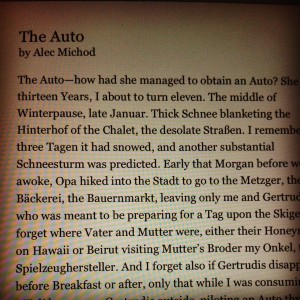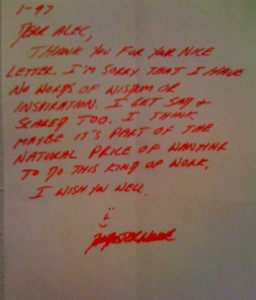Sometimes the best surprises arrive in unmarked brown boxes. In this case the mysterious contents appeared to be harmless enough, despite the intimidating immensity of the thing: it was the new novel by the great Hungarian writer Péter Nádas, a 1,000-plus-page behemoth called Parallel Stories.
Like his last titanic tome, A Book of Memories, the new novel–written over the course of 18 years, published in the author’s native Hungarian in 2005–is a manic, meandering narrative, a multitude of stories that do (and don’t, exactly) come together. (For more on the plot, read this helpful analysis, “The Body of the Text: Corporeal Writing in Péter Nádas‘ ‘Parallel Stories,’” by Hungarian literary critic Gábor Csordás.) But yet, it doesn’t read as a mess, at all, and, having recently completed a book comprised of independent narratives that do (and don’t) quite come together, I was–I am–entranced. Here is a writer whose every sentence carries moral significance, without being linguistically heady. Here is a book that contains no single center, without falling apart. Nádas writes:
There was somebody else in him, another being who was not a person but who followed his every thought and movement. Whatever he missed, whatever he did or intended to do, this someone was watching impassively, voicing no opinion but not leaving him alone either.
…and one has the sense that he is talking about himself, about what every writer goes through–the agony of composition.
Embarrassingly, I’d managed to get by in life without reading Nádas until now. Of course, I remember seeing A Book of Memories at 57th Street Books when it was published stateside, and I remember picking it up and being interested, and I remember my good friend, who came from Hungarian stock, urging me to read it, and I remember being interested … and yet, and yet, like inexplicably, nonsensically avoiding writing anything in the first-person, like keeping Don Quixote on the toilet for the duration of my high school years–I am guilty of both–I didn’t dive right in. And now I know why: because now that I am free of my own multi-storied narrative, I can dive in without being filled with an anxiety that I will be unnecessarily influenced one way or the other. Now I can let Nádas‘ words consume me. And they are consuming in a way no American writer’s words can be, if we are to believe what Deborah Eisenberg wrote about A Book of Memories:
Here in the West, fiction writers are welcome to be absolutely outspoken; maddeningly, no one much cares what we say—we pose no threat. […] It is as if fiction has largely come to be treated as a self-enclosed arena, and judged by standards that have little to do with the living world beyond it; in our life of the moment, which is both highly politicized and highly commodified, whatever we have to say is in danger of being transmuted, as soon as it hits the paper, into something trivial and inessential. Perhaps part of the problem is that not only have we not located the obstacles to our meaningful expression, we hardly discern that there are any.
It is an intoxicating notion, especially in our new American millennium, already so filled with terror and financial collapse: Does the torment of totalitarianism foster a morally important narrative consciousness? Can any American writer, free from the trappings of the state, to paraphrase Eisenberg, create a novelistic world filled and layered with the shadows of self, as Nádas has done–or does this kind of writing necessarily proceed from the pandemonium of living in a dictatorship? Yes and no. I certainly don’t think someone like Vladimir Sorokin, had he been raised in the vast mall-clogged suburbia of New Jersey or California, say, would have peppered his absurdist black comedies with quite as intense scatalogical hijinks (perhaps if he’d grown up in Florida). Would Sarah Palin have provoked the buggery Stalin did? Of course not. And yet I do think, as Nádas himself has pointed out, that living under the incessant paranoid watch of a Communistic regime led, directly and indirectly, to the chaotic novelistic structure evident in Parallel Stories. “Under conditions of dictatorship,” Nádas has said about his stylistic approach in the new novel,
one asked whether or not a novel had ethical commitments. I decided that it did. But in a democracy this is no longer the case. Nobody could have foreseen the end of the dictatorship, including me, but it was the reason why I started on a new novel—working at a mad pace—that no longer accepted self-limitations, even for ethical reasons. The stuff of this novel was closer to anthropological or ethical description, if you like—more dispassionate, more attuned, on and off, to answering the question “What sort of a being is man?” And in answering this it would treat other people’s opinions and beliefs as simple raw material, just as a doctor does when he gives a person an anesthetic and does not take into account their sensitivities in other circumstances or worry about their nakedness.
Of his sense of structure Nádas has said that it derives from chaos, “not in the present-day sense of this word, of course, but in the ancient Greek sense […] not chaos as a synonym of disorder, lawlessness, or a brothel in Mexico, but chaos in that each story has an aspect that you cannot tie to anything else. The structure,” Nádas continues,
is chaotic because the world is chaotic, and I, the novelist, do not want to create an arbitrary semblance of order in this chaos. I’m not capable of it; I would be telling a lie if I said I was. At most I register the elements and principles that are structure-forming within the chaos, and others that are not suitable for this. Thus you arrive at some organizing principles that emerge involuntarily. They inevitably partake of order. But they aren’t the elements and principles that people, either collectively or alone, imagine for themselves as tools for creating some great order.
Creating arbitrary order in chaos–isn’t that what novelists have done since time immemorial? Isn’t that, too, what you get when you endeavor to put one word after another, when the measure of each word adds up to sense as opposed to randomness or nonsense? Without order the words would just be marks on a page, right? But I have always been attracted to writers who create their own methods, no matter how mad they may seem, perhaps because I myself, when writing, reject the order of an outline, preferring instead to fumble my way into the darkness ahead, sometimes knocking my head against a brick wall, sometimes–not as often as I’d like–finding a golden nugget, a multi-dimensional turn of phrase, something that doesn’t suck on second reading. It is precisely the involuntary nature of Nádas‘ writing that attracts me, and that is why this new novel, brimming with the sensory textures of elision and longueur, is so compelling to the early-twenty-first-century reader.
With its asymmetrical structure and center that somehow will hold, Parallel Stories recalls those other peculiarly constructed (and, more often than not, flatulent) novels 2666, Cloud Atlas, and … there really are quite a few: Infinite Jest, Tree of Smoke, Underworld, Against the Day in our immediate past, boomeranging back to the founding texts of the idiosyncratic literary vision, including but not limited to Absalom, Absalom!, Moby-Dick, and Hopscotch. And as in those unpredictable, misshapen tomes, in Parallel Stories the author sets his own narrative rhythm, neglecting to follow any accepted rule or regulation. Clearly denote time and place? Nádas isn’t interested in that. Keep narrative perspective singular in each given block of text? Nádas prefers to float, as if through air, from one consciousness to the next, taking his time, dancing slothfully around the room of his imagination from character to character, almost always without forewarning. The critic James Wood might call it free indirect speech, but it seems in Nádas‘ case to be a bit more far-ranging. In Parallel Stories, almost every character gets his narrative close-up.
And this, I think, is what will be of incontrovertible interest to the budding young practitioner of narrative: the digressions. Almost every other paragraph the novelistic gaze meanders from one thing to another, not unlike a movie camera pans around a diner in a forgotten film, from a phone ringing and ringing to a man standing at a window to the naked woman he has left behind in bed, jarred awake by the phone, still flushed from last night’s entanglements. She
forced herself back to sleep because she wanted to forget what had happened during the night and dozed off, or was startled to wakefulness again. Not because of the morning noises and not because of the persistently ringing telephone. It was as if she were taking a ferry docked now at this shore, now at the other. It seems she must have really been dreaming; she dreamed of crossing over. She dreamed of shores that did not differ from each other; no bushes or trees, not a single tree anywhere, only farm wagons, jostling cattle and people wrapped in clouds of dust as they streamed forth from the vast lowlands. The last images of her dream remained glued for a while to the surface of her wakefulness. The river was enormously wide, murky, the surface of its dull, glistening water almost convex. From one shore the other shore could not be seen. But I should see it, she thought half-asleep, remembering the shore she had left, but it’s impossible this is an impossibility. At the same time, she did not know what she should be seeing. The words clattered hollowly in her head; she did not comprehend their meaning even when awake.
One can imagine the writing workshop being held in some neo-Cubist pantheon, the disgruntled mid-list novelist offering his critique to the hopeful yet unsuspecting young writer, no doubt to the effect of hey, man, cut this whole thing–it’s repetitive, it sure as shit doesn’t move your story along, and who writes about dreams nowadays, anyway? Dreams are cliche, dude. But, in fact, the digression does serve a purpose. Not only does it speak to the troubled history which has afflicted the writer’s hometown, the political crossings people make between Buda and Pest. It also illuminates the plight of the young woman, Gyöngyvér, who herself is a stranger in a very strange land. And so the political and the personal are merged, and Nádas is able at last, a couple paragraphs later, to dispense with some very narratively important information: “The young man named Kristóf had in time become her obsession.” And this is how the reader comes to know that we are lost in a love triangle of sorts, only since this is Nádas and not the unbearable lightness of Kundera, we are soon ferried off into turbulent murky waters, in this instance Hungary circa 1956, when around 20,000 students, stoked by post-war repression and economic turmoil, crossed the Danube River en masse, chanting lines from a popular censored poem of the period, We will no longer be slaves, as they convened in front of the Országház or Parliament Building. Rather than direct us in to the heart of the uprising’s darkness, however, Nádas positions us at a curious remove, namely in an “eighty-year-old exceptionally eurhythmic building” where, we’ll soon find out, only not just yet, quite a few of the novel’s characters reside. The next pages, rather than detail the copious horrors of the uprising being quashed by the Hungarian secret police and, eventually, the Soviets, introduce us to the plight of the building’s architect, a bit of a dandy, it seemed to me, but also “fit, aggressive, sly, and mean.” The next mention of the Revolution comes buried within the architect’s story, “a few senseless submachine gun bursts sprayed” into the building. Only later do we arrive back to our original story line, one, it turns out, of a vast many. The Da Vinci Code this is not, mercifully: and yet the reader is still kept at the edge of his seat, as it were–due in large part, I think, to Nádas‘ sly reliance, on the one hand, on the meandering tensions of a neo-classical storytelling and, on the other, the stylistic flourishes of the nouveau roman.
I should come right out and confess that I’m not a huge fan of what might be called stylistic fussiness. Style for style’s sake, especially when it comes at the expense of story, strikes me as unnecessary and show-offy, even when it’s packaged as one of the founding texts of the nouveau roman, such as Robbe-Grillet’s La Jalousie. So I’ll leave it to someone else to explain exactly how Nádas incorporates the tenets of the nouveau roman, although one thing that strikes me about his style is a curious avoidance of question marks. My guess is it has something to do with the indeterminacy of growing up under the oppression of a Communist dictatorship, or else it’s nothing more than a stylistic tic, not altogether dissimilar from someone who leaves the bottom button of his untucked button-down shirt unbuttoned “just because.” No, it’s not accidental, it can’t be accidental–a writer like Nádas, we want to think, doesn’t do anything “just because.” And he’s not, among literary titans, alone in his stylistic peculiarities. Faulkner’s fetishization of italics is well-documented, although originally he wanted each voice in The Sound and the Fury to be printed in a different color ink. Cormac McCarthy, perhaps our most popular “difficult” writer, avoids pretty much everything outside the comma and the period. And Thomas Pynchon has largely foresworn the semi-colon since Gravity’s Rainbow was published (a couple semi-colons appear in Mason & Dixon, albeit only in quoted texts such as letters and the like).
I don’t mean to suggest that there’s any direct correlation between a writer’s punctuation preferences and his narrative strategy. But there is a correlation, all the same: Certainly, how Faulkner, Cormac McCarthy, Pynchon and Nádas tell their tales is affected, stylistically as well as narratively, by whether or not, for instance, they use quotation marks in their dialogue. The question, it seems to me, is where does the digressive urge come from and why am I–why are any of us, writers and readers alike–particularly attracted to it? Why do we want fractured narrative and incompletion? Why do we want the center not to hold? Is it because of our increasingly fragmented culture, or because when, in my own case, as a kid, I liked to read Choose Your Own Adventure books? I’m not convinced I’d developed an exhaustion with traditional narrative back then–indeed, the fact that I also devoured Agatha Christie paperbacks was evidence, if any was needed, that narrative and I got along just fine.
Or more simply:
If the great English novelist and linguist Anthony Burgess was onto something when he wrote, in A Mouthful of Air, that literature arose as an expression of “loneliness and exile–a cry in the dark, whistling in the dark”–then what are we to do with these writers of irregular and imperfect texts like Nádas and, for that matter, Bolaño, David Foster Wallace, David Mitchell? Does the narrative irregularity emerge out of their stylistic exile, or the other way around?
“My job as a novelist,” writes Nádas, “is not to come up with compact theories for interpreting the world, but to retain the narrative’s independence and spontaneity alongside existing theories or in opposition to them. The process should not break down, even though the world is not symmetrical and in theory the process should break down.”
Intertextuality, interconnectivity: we live in an age of overlapping narratives. Stories are told, no longer only in books, but in a cloud—that, at least, is what the ingenious techno-wizards of the age would have us believe. In a way, it’s true: stories infiltrate our lives and memories through a variety of ways—television, tablet, smartphone, dumbphone. Ads on subways, 3D banners on the infinite Internet: the words might try to sell something, but what we’re buying is story. And it’s inescapable. If we try to escape narrative, narrative finds us, sinks its mangled teeth into us, tries not to let go. Then again, narrative has always been a predatorial species, it seems to me—it seeks us out, not the other way around. Of course, being stalked by narrative isn’t necessarily a bad thing. Depends on the narrative, I suppose. And you—you might not want to have anything to do with narrative, but then you’d be shit out of luck. Unless you’re a novelist, in which case you’d be shit in luck. For the novelist, after all, nothing is as thrilling as being unable to escape the advances of the novel you’re writing.
This narrative seizure—incantatory, dream-like, addictive—has been the stuff of literary legend. We all know about the Surrealists and their automatic writing, and Jack Kerouac might have locked himself up in a bathroom and pounded out On the Road in a tub in what one must imagine was a dizzying—not to mention uncomfortable—three-week bender. Even Kafka, as Milan Kundera reminds us in Testaments Betrayed, wrote his long story “The Judgment” in a “single night, without interruption.” As Don DeLillo suggests, in his fantastic Paris Review interview, this is the state writers aspire to—but it’s a state of writing not without its contradictions. “You want to exercise your will, bend the language your way, bend the world your way,” DeLillo says. “You want to control the flow of impulses, images, words, faces, ideas.” But, DeLillo realizes, “you [also] want to let go. You want to lose yourself in language, become a carrier or messenger.”
But where does this urge for narrative release come from? From the oral tradition, perhaps: according to a case study of Turkish romance storytellers, published in the Journal of American Folklore, the digressive mode developed hundreds of years ago as a way to invite modernity into stories. Beowulf is mostly digressional, and Homeric epics are unafraid to veer off from their central narrative course, into the deep waters of the unexpected. And then, of course, there’s the stylistic restlessness of the first novels. Defoe, Cervantes, Swift—one could argue, I suppose, there’s a Choose Your Own Adventure aspect to their work. Modern, manic, Laurence Sterne’s The Life and Opinions of Tristram Shandy, Gentleman strikes me as stylistically daring as the latest Pynchon or Mitchell. And not purely narratively speaking: page 71 of the original, for example, is an entirely black page, intended to portray sorrow, or so we’re told, although when I gaze into its void I see the book of the future, whatever that may be.
In its beginnings, so in its ends: something like that. Not that the novel will end. Even in this new age of the glorified serial drama, of The Wire and Deadwood. But, no matter how good TV gets, no matter how much it tries to replicate narrative playfulness on the screen, it will never be able to compete with the original harbinger of “this completely weird outpouring strangeness,” as Jennifer Egan, no stranger to narrative jujitsu herself, has said of the novel. Even if we’re not, as Egan has it, exploiting the possibilities as much as we should be, the novel will adapt. It will evolve.
To paraphrase Don DeLillo: the novel leads; it doesn’t follow. And that is why books like Tristram Shandy will always matter to those of us who care about these things. After all, we don’t read the book that was inspired by Tristram Shandy–we read Tristram Shandy. We don’t read Gaddis’s imitators–we read Gaddis. We read the trailblazing lunatics, like Péter Nádas, who are unafraid to follow the form into uncertainty.








